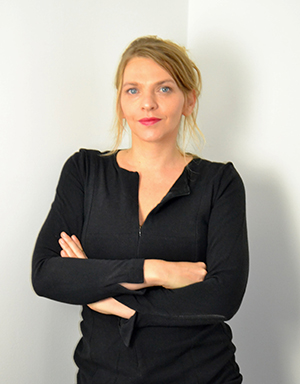Mag.a phil. Ivana Pilić, Bakk.
Ivana Pilić ist freie Kuratorin und Kulturwissenschaftlerin. Derzeit promoviert sie am Schwerpunkt Wissenschaft und Kunst der Universität Salzburg und des Mozarteums zu „diskriminierungskritischen Kunstpraxen“. Seit 2020 ist sie Co-Kuratorin des Kunstprojekts D/Arts – Projektbüro für Diversität und urbanen Dialog. Davor war sie als Co-Kuratorin des urbanize! Internationales Festival für urbane Erkundungen 2018 tätig und von 2014-2017 im künstlerischen Leitungsteam der Brunnenpassage Wien. Ihre Arbeitsschwerpunkte liegen in der Erforschung transkultureller Formate und der Entwicklung von diversitätskritischen Konzepten im Kulturbetrieb. Sie ist Vorstandsmitglied der WIENWOCHE – Festival für Kunst und Aktivismus. Ivana Pilić berät Kulturinstitutionen und -politik im Bereich Diversity and Arts, ist in Beiräten und Gremien aktiv und als Jurorin tätig, u.a. für „Tandem Diversität“ der Schweizer Kulturstiftung Pro Helvetia
Dissertationsvorhaben:
Über Polyphonie und Transformation: Politische Erweiterungen von Wissensordnungen für ein Wir im Werden durch theatrale Inszenierungen & Performances
Erstbetreuerin: Univ. Prof.in Kyoko Shinozaki, Ph.D., Paris-Lodron-Universität Salzburg, Fachbereich Politikwissenschaft und Soziologie
Zweitbetreuerin: Prof.in Dr.in Nora Sternfeld, Hochschule für Bildende Künste Hamburg, Kunstpädagogik
Abstract
Das Ziel dieses Forschungsvorhabens ist es, sowohl für die Forschung als auch für die Kulturarbeit einen Beitrag zur Systematisierung transformativer und diskriminierungskritischer Kunst(-produktion) zu leisten, um mittelfristig Möglichkeitsräume für die Teilhabe marginalisierter Bevölkerungsgruppen zu öffnen. Dabei wird das Begriffspaar Inter- und Transkultur theoriegeleitet als Ausgangspunkt genommen, um die Fragestellung – wie konzeptionell mit Differenz umgegangen wird – zu untersuchen. Eine empirische Analyse der – oftmals impliziten – Differenzkonstruktionen und deren Übersetzung in ästhetisch-künstlerische Ausdrucksweisen und Formate dient als Basis zur systematischen Erfassung und Analyse von inter- und transkulturellen Methoden in theatralen Inszenierungen und Performances. Die Performance Grundgesetz. Ein chorischer Stresstest der Regisseurin und Sängerin Marta Górnicka wird hierbei zum Ausgangspunkt der Untersuchung genommen. Anhand von Górnickas Grundgesetz soll exemplarisch gezeigt werden, wie eine künstlerische Arbeit aussehen kann, die keine Reproduktion von Vorstellungen ethnisch homogener Gruppe bedient, indem sie diesen das Bild einer sehr vielfältigen Gemeinschaft von Individuen entgegensetzt. Differenzen werden jedoch nicht eingeebnet, vielmehr sind diese etwa stimmlich hörbar, stehen nebeneinander und ergänzen sich.
Im weiteren Forschungsverlauf werden die erfassten künstlerisch-ästhetischen Ausdrucksweisen und Formate über ein experimentelles und kollaboratives Forschungssetting auf ihren diskriminierungskritischen Gehalt hin überprüft. Um im etablierten Kunst- und Kulturfeld Ausschlussmechanismen sichtbar zu machen, sollen die Erkenntnisse dieses Forschungsvorhabens in einem letzten Schritt künstlerisch übersetzt werden. In einer theatralen Inszenierung werden dabei die den Kulturbetrieb kennzeichnenden Realität(en) – durch Augmented Reality – visuell erweitert. Dieser Teil des Forschungsvorhabens soll Wahrnehmungsdispositionen durchkreuzen, Ausschlüsse und Instrumentalisierungen, aber auch Strategien aufzeigen, um marginalisierte Gruppen teilhaben und zu Wort kommen zu lassen.
On Polyphony and Transformation: Political Extensions of Knowledge Orders for a We in the Making through Theatrical Staging & Performances
The aim of this research is to reflect on the systemization of transformative and discrimination sensitive art (production), thereby contributing to the current body of research and to cultural work in general. Ultimately, this research seeks to create opportunities in the medium term for population groups that, are marginalized, allowing them to actively engage in art practice. The terms ‘intercultural’ and ‘transcultural’ will be examined in view of their theoretical implications to arrive at the following research question: how is difference addressed conceptually? This research question will be investigated in an empirical analysis of various constructions of difference, which are often implicit in nature. Furthermore, this analysis will examine how these constructions are translated into particular aesthetic-artistic modes of expression and formats, followed by a systematic compilation and analysis of inter- and transcultural methods used in theatre projects and performances. Marta Górnickas performance Grundgesetz. Ein chorischer Stresstest is taken as an example and as the starting point of the investigation. The director and singer Górnicka shows exemplarily what an artistic work can look like, that does not reproduce the idea of ethnically homogeneous groups by referring to a very diverse community of individuals. Thereby differences are not levelled: they are vocally perceptible, stand side by side and complement each other. Subsequently, these methods and modes of production will be subject to an in-depth review of their anti-discriminatory content in a research-setting that is both experimental and collaborative.
The final step in this research entails implementing its results into a performance which makes mechanisms of exclusion in the established cultural scene clearly visible. Thereby, realities that can be found in the cultural sector are going to be visually expanded through augmented reality. Consequently, this part of the research entails artistic processing of both exclusion and instrumentalization as well strategies which help marginalized groups to make their voices heard.
Short biography
Ivana Pilić works as a cultural worker, curator and diversity-consultant. She was co-curator of urbanize! Internationales Festival für urbane Erkundungen 2018. From 2014-2017 the assistant artistic director of Brunnenpassage in Vienna. In addition to her curatorial activities, her focus lies on the development of diversity-sensitive and participatory concepts for the cultural field, for example for the Zukunftsakademie/Bochum or the cultural foundation Pro Helvetia/CH. She is interested in the interface between theory and practice, between contemporary art and political participation. She is the co-author of the book Art Practices in the Migration Society. Since 2016 she is a board member of the cultural festival WIENWOCHE and has been part of the advisory board for district culture and interculturality of the cultural department of the city of Vienna since 2018.






